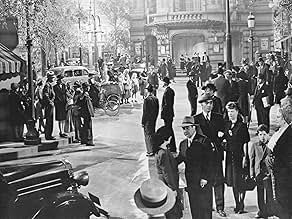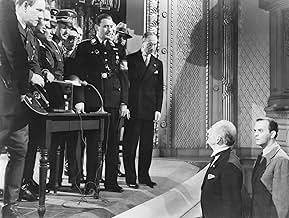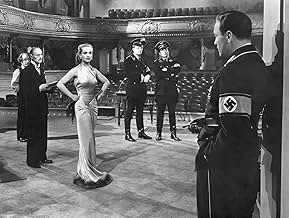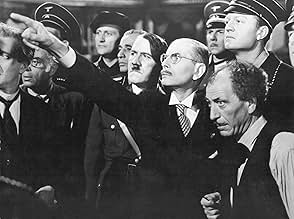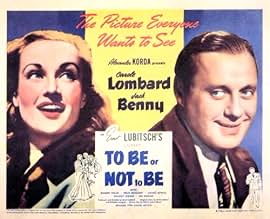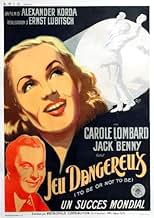During the German occupation of Poland, an acting troupe becomes embroiled in a Polish soldier's efforts to track down a German spy.During the German occupation of Poland, an acting troupe becomes embroiled in a Polish soldier's efforts to track down a German spy.During the German occupation of Poland, an acting troupe becomes embroiled in a Polish soldier's efforts to track down a German spy.
- Director
- Writers
- Stars
- Nominated for 1 Oscar
- 5 wins & 2 nominations total
- Polish RAF Pilot
- (uncredited)
- German Soldier
- (uncredited)
- Director
- Writers
- All cast & crew
- Production, box office & more at IMDbPro
Summary
Featured reviews
When I was 16 (20 years ago, sigh...), this was re-released for a short time in a local art-house cinema, and my father insisted I go watching it with a friend. Well, teenagers don't normally line up to see 50 year old black and white comedies, but - man, was I glad I did!
This is a pitch black comedy that feels as fresh today as it must have then; in fact, this must have been kind of a shock in 1942. There are no cheesy clean characters or cringe-worthy lines: this is a firework of fast, witty dialogue with an edge and the sexiest, cleverest (and most morally ambiguous) female protagonist I have ever seen in a film before the "New Hollywod" era.
Even the structure and the way the story evolves are very modern; there are flashbacks and twists and turns that might be very common in contemporary films but must have seemed almost "avant-garde" at the time.
The biggest fun, of course, is how Lubitsch takes the pi** out of Hitler's blind, fanatic followers. I don't believe the Nazis have ever been mocked better than in this comedy masterpiece (and I only hope old Adolf has seen it, too). Mel Brooks' remake is not bad, but the original is simply killer.
See it, and then see it again (and again).
Priceless. 10 out of 10
Favorite films: http://www.IMDb.com/list/mkjOKvqlSBs/
Lesser-known Masterpieces: http://www.imdb.com/list/ls070242495/
Favorite Low-Budget and B-Movies: http://www.imdb.com/list/ls054808375/
Favorite TV-Shows reviewed: http://www.imdb.com/list/ls075552387/
This Hitler, however, turns out to be the actor Bronski (Tom Dugan), a bit-player impersonating the Fuhrer in a play being put on by a Polish theatrical group. Is Hitler "by any chance interested in Mr. Maslowski's delicatessen?" teases the narrator in the opening segment. "That's impossible—he's a vegetarian!" Responding to all the "Heil Hitler" salutes, Bronski asserts "Heil myself" as he walks through an open door. Bronski is playing a secondary role to the famous Polish actor Josef Tura, played by Jack Benny, then a radio star whose trademark straight face and deadpan humor marks the film.
Tura's wife Maria, also a popular Polish actress, is played by Carole Lombard who was to meet a shocking death in a plane crash in January, 1942 shortly after the film was completed. In the film, Maria is two-timing her actor husband by romancing a young flyer Lt. Sobinski (Robert Stack) who falls "head over heels" for the actress. The running gag in the film is that whenever Josef is playing Hamlet and delivers the line, "to be or not to be," it is a signal for Sobinski to get up from his seat in the theater and go backstage to meet Maria in her dressing room. It appears that Tura is more upset about his speech being interrupted than what happens behind the curtain.
The sudden Nazi invasion, however, puts all romantic trysts on the back burner and the mood shifts to solemn. The plot now becomes more involved with espionage and patriotism than acting when Sobinski, now a pilot for the Royal Air Force, discovers that respected Polish professor Siletski (Stanley Ridges) is a double-agent working for the Nazis. When the Lieutenant returns to Warsaw to eliminate the traitorous professor, Maria and Josef team up to help by launching an elaborate charade to trick the unsuspecting Nazis. While the film takes its name from the famous line in Hamlet, Shylock's monologue from the Merchant of Venice, spoken in front of Nazi swastikas, is recited by Jewish actor Felix Bressart, "Have we not eyes? Have we not hands, organs, senses, dimensions, attachments, passions?" he asks the Nazis, "If you poison us, do we not die?"
It is a noteworthy plea for tolerance in the days of rabid anti-Semitism even though the line "Hath not a Jew eyes?" is not spoken. According to Thomas Doherty writing in Tablet magazine, "the word "Jew" was seldom heard on the Hollywood screen, even in war-minded scenarios where the topic of anti-Semitism was front and center." He also quotes film historian Lester D. Friedman saying that "The studio bosses were always—even at this point—afraid of thrusting Jews into the spotlight." Whatever the reason, To Be or Not to Be is marked with the genius of one man, the great Jewish director Ernst Lubitsch who said, "What I have satirized in this picture are the Nazis and their ridiculous ideology," and that the tone and temper of the film "cannot leave any doubt in the spectator's mind what my point of view and attitude are toward these acts of horror."
While the film is a broad and biting satire, from the beginning of production in November 1941 to its completion on December 24th, however, events made sure that To Be or Not to Be, as well as Charles Chaplin's The Great Dictator, was no longer a laughing matter.
Found 'To Be or Not to Be' a truly fabulous film, have seen many very good to masterpiece films recently (as well as inevitably some duds) and this stands out among the very best of them. What could easily have been tasteless and offensive, with what it was satirising and considering the time, turned out to be one of the funniest comedies seen recently and ever actually and wartime comedies have seldom been funnier or more original. It also contains some of the best work of all involved. In front of and behind the camera, am aware that sounds very cliched but to me it's true.
'To Be or Not to Be' looks great, immaculately yet atmospherically designed with a real sense of period and beautifully shot without being too glamorous. The music is neither too jaunty or low key, while Lubitsch's direction is one of 'To Be or Not to Be's' biggest stars in its sophisticated style that one can recognise from anywhere.
Regarding the script, it is intricate and full of sharp wit and hilariously quotable lines that as mentioned above in my first paragraph when talking about the material being daring. The opening gag is hysterical and one that one does not expect, while the running joke concerning Robert Stack as Maria's (played by Lombard) admirer is an example of a running joke that doesn't get old prematurely and doesn't get repetitive, dangers with running jokes. 'To Be or Not to Be' is not just non-stop hilarity though, there is also surprising pathos that one doesn't always get in comedy and is genuinely poignant. Affectionate and inspiring are further things to describe and never had any problem with the pace.
Lubitsch's direction is one of two particularly wonderful things about 'To Be or Not to Be'. The other is the simply sublime cast, showing Jack Benny at his funniest and Lombard being an absolute joy in all senses (found her touching too but a lot of it was to do with it being her final film and what a talent she was). Stack is amusing and charming and Stanley Ridges and Sig Ruman are great fun.
Altogether, fabulous. Even in films that fit in the "loved it" category, improvements can be pointed out in order to be balanced, but in the case of 'To Be or Not to Be' there is nothing to fault. 10/10
Easily the best of the screen versions. The cast is tight and the timing is impeccable. You can really tell that the cast believed in the film. Since America had not taken a formal stance at the time this went into production the producers, cast, and crew were really making something revolutionary and controversial. So much so that the making of this movie was not even mentioned on the Jack Benny radio program. Which is a major deal for those familiar with Old Time Radio, Jack's film career provided excellent material for comedy writers on the radio show, but also the radio show was an excellent opportunity to promote a movie. It is doubtful that this was a missed opportunity, what is more likely is that his sponsor or perhaps the network did not want to advocate a position.
This movie is wonderful for so many reasons. Not only is it hilarious, there is suspense, intrigue, and history. Another poster, mentions the Nazi's jumping out of the plane at the order of a radio transmission by Hitler. The thing to remember here is that the Nazi army was seen as an unstoppable war machine, so efficient, that soldiers would commit suicide if asked. This was less humor than it was to evoke fear of fascism.
Everyone remembers Bob Hope and his travels during WWII, well Jack Benny and Carole Lombard were no slouches either. After all they made this movie. Carole died in a plane crash along with her mother and twenty others returning from a war bond rally before the film was released. Jack went where few if any cameras or radio transmitters could reach. He could be found in the most remote parts of the world entertaining the troops. Not to take anything from Bob, he went there as well, he just had more photo ops.
Bottom line watch this movie--twice, maybe more, the dialogue is so quick and witty there is a good chance you might miss it the first time, them again it is worth at least to looks.
A cracking comic-caper, it follows a troupe of Polish actors who find themselves performing the roles of their lives- not on stage, but in Nazi-occupied Warsaw. When a young pilot is caught up in a spy plot, the troupe leaps into action, donning disguises, bluffing Gestapo officers and improvising as if their lives (and country) depend on it. At the centre is Benny's Joseph Tura, the pompous Hamlet-in-residence, and Lombard, as his wife Maria, luminous and quick-witted in what was sadly her final screen role.
The film effortlessly juggles tones. One moment it's pure farce- theatrical egos, slippery identities and a Hamlet with more flair than sense- and the next, it glances at real peril with a surprisingly steady gaze. Beneath the laughs, there's a pointed satire about authoritarianism, vanity and the roles people play to survive. The dialogue crackles with razor-sharp wit, every line balanced like a dagger on the edge of a laugh. Whether it's Benny's oblivious grandiosity or Lombard's wry deflections, Lubitsch keeps the script dancing- light on its feet, but never light on substance.
That Lubitsch made this film at the height of the Second World War is nothing short of astonishing. While Hollywood largely played it safe, he aimed straight for the absurd heart of fascism, daring to laugh. But this isn't mockery for its own sake- Lubitsch understood that ridicule, when wielded with precision, can be a subversive weapon. His satire is never cruel, but it is fearless: mocking vanity, the ridiculousness of the Nazi ideology, exposing cowardice; reminding us that even in the darkest times, a well-delivered line- or a perfectly timed pause- can carry a kind of truth that outlasts bombs and bluster.
Visually, the film is no slouch either. The production design conjures a grand theatrical world, full of velvet curtains, dressing rooms and shadowy corridors. Rudolph Maté's cinematography adds a crisp elegance, framing scenes with the same precision Lubitsch brings to the dialogue. It's handsome without being showy, stylish without upstaging the script; perfectly suited to the unfolding farce.
The cast is uniformly excellent, but it's Benny and Lombard who give the film its centre of gravity- or, rather, its comic orbit. Benny, one of the all-time comedic greats, leans gleefully into Joseph Tura's preening vanity, delivering a performance that's both absurd and oddly endearing. He plays a man desperate to be taken seriously, even as the world refuses to play along- a joke that never stops landing.
Lombard, by contrast, is all grace and mischief. Her Maria is a master of timing, charm and quiet control. She brings a knowing sparkle to every scene she's in. Sadly, Lombard would die before the film finished post-production- in this way it acts as a sterling swansong for a cinematic legend. Around them, the supporting players- from Sig Ruman's delightfully blustering colonel to Robert Stack's earnest pilot- flesh out a world where everyone, it seems, is playing to the gallery, even when the stakes are deadly.
Ernst Lubitsch's 'To Be or Not to Be' is a marvel- a film daring to be funny when all signs point to despair. It's sharp, silly and strangely stirring, a comedy that looks evil in the face and responds with a raised eyebrow and a perfectly arched punchline. In a world too often content to play it safe, Lubitsch reminds us that the boldest laughs are the ones that speak the hardest truths. Strongly acted and beautifully shot, 'To Be or Not to Be' ultimately proves that in the face of tyranny, the best answer is always to be- to laugh, to fight and to defy.
Did you know
- TriviaWhen Jack Benny's father went to see this movie, he was outraged at the sight of his son in a Nazi uniform in the first scene and even stormed out of the theater. Jack convinced his father that it was satire, and he agreed to sit through all of it. His father ended up loving the film so much he saw it forty-six times.
- GoofsAlthough having Maria Tura give the cue line "To be or not to be" to the men in the audience she wishes to meet in her dressing room is a very funny premise of the film, it actually would be highly impractical for Maria to think she would have time to meet backstage. Hamlet's "To be or not to be" soliloquy is only about 3-4 minutes long and Ophelia has the very next line in the play (in fact Hamlet announces her entrance at the end of his soliloquy), which would barely give Maria any time to meet men in her dressing room.
- Quotes
Joseph Tura: [disguised as Professor Siletsky - speaking about Maria Tura] Her husband is that great, great Polish actor, Josef Tura. You've probably heard of him.
Colonel Ehrhardt: Oh, yes. As a matter of fact I saw him on the stage when I was in Warsaw once before the war.
Joseph Tura: Really?
Colonel Ehrhardt: What he did to Shakespeare we are now doing to Poland.
- Alternate versionsIn Poland, a brief introduction was edited in. Polish actor Kazimierz Rudzki assured the audience that the movie was done with best intentions by their "American friends". At the time the movie screened in Poland, many people still lived in trauma from the events of World War II; few could find comedy in the German invasion of Poland, instead finding the movie in poor taste, offensive, or hard to swallow.
- ConnectionsFeatured in Showbiz Goes to War (1982)
- SoundtracksPolonaise in A major, Op. 40, No. 1, 'Military'
(1838) (uncredited)
Written by Frédéric Chopin
Orchestral arrangement by Aleksandr Glazunov
Heard during the opening and closing credits
- How long is To Be or Not to Be?Powered by Alexa
Details
Box office
- Gross US & Canada
- $3,270,000
- Gross worldwide
- $4,578,000
- Runtime
- 1h 39m(99 min)
- Color
- Aspect ratio
- 1.37 : 1

